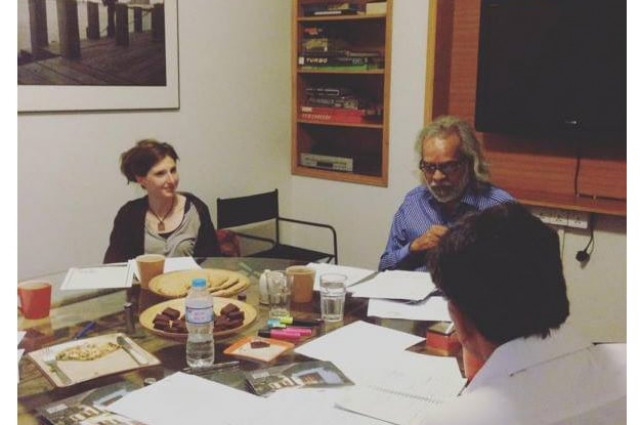Poets talk about shared experiences
Workshop brings together six poets who translate each other's work

'Poets Translating Poets' in session at T2F. PHOTO: twitter.com/thesecondfloor
These thoughts were shared by a panel of six poets from various backgrounds - two Urdu poets, two Sindhi and two Germans - at a poetry reading and panel discussion at The Second Floor on Monday.
Literary delight: Poetry comes to life at ZEBRA Poetry Film Festival
The five-day workshop, Poets Translating Poets, brought these six poets together, who translated each other's work in Sindhi, Urdu and German languages. In the session, moderated by writer Asif Furrukhi, the translated and original works were read out and poets shared their experiences regarding the venture.
The Sindhi poet, Amar Sindhu, said that the experience was exciting for them because they got to understand each other's languages and got the opportunity to know more about the cultures of one another.
Renowned poet Afzal Syed Ahmed believes that the problems of humanity are same. "In their [German] poems, you get to see the condition of yourself and your country," he said. The German poet Daniela Danz agreed with Ahmed's views regarding the content of poetry. "Some of the poems here are very similar to what I do. The culture is different, but on the verse it is the same," she said.
Stimulating minds: A night of poetry and laughter

Sharing some personal accounts with the audience, Sindhi writer Attiya Dawood said that the project was refreshing for the poets. "In one of Danz's poems, she had compared a child's cheek to silk, something that is very familiar to us and such comparisons are very close to us," she said.
Appreciating the cause of the event, another German poet Andreas Altman said that the workshop added to his wealth of poetry. "Through poetry, I felt that everyone is really close," he said.
When the translated poems were read to the audience, the Islamabad-based Urdu poet, Ali Akbar Natiq, explained that the rhythm that one finds in Urdu poetry can be found in German verses too. Natiq read out the translated version of Daniela's poem, setting the pace from the very opening verses. "Agar tum ek weeranay main tanha ho, tumharay chaar su chaya ho khamoshi ka saya [If you are alone in wilderness, you are surrounded by a shadow of silence]". Similarly, Daniela read out Sindhu's poem based on the very first Hindu-Muslim riots in Sindh back in 1944, when a certain Hindu figure, Bhagat Kunwar, was shot.
Men of letters: ‘Sufis transformed poetry’
Attiya Dawood read out a touching poem about a woman wanting to be treated as an equal by her lover. The verse starts with simple yet impactful words, "Mere mehboob mujhe tum se mohabbat hai [My lover, I am in love with you]," and ends with a desire, "meray mehboob mujhse aise baat karo, jaisay apnay doston se kertay ho [My lover, talk to me as you talk to your friends]". The poem was translated and read out by Andreas Altman. Earlier, a poetry film festival was organised under the same project in which various poems were depicted as poetry films.
Published in The Express Tribune, November 18th, 2015.



















COMMENTS
Comments are moderated and generally will be posted if they are on-topic and not abusive.
For more information, please see our Comments FAQ